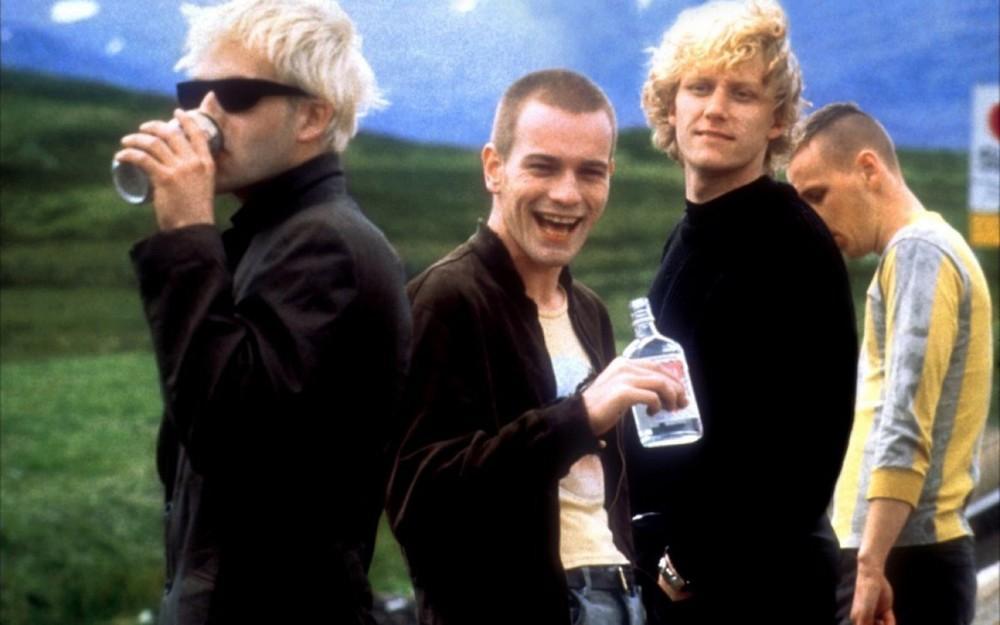Before Trainspotting, the youth of Scotland rarely saw their country on screen. It was 1996, and the idea of devolved power in the country was a mere fantasy to many of those living there. Instead, questions about their lives were being debated 400 miles away in Westminster. John Major was in 10 Downing Street; it was still 18-odd months before Tony Blair and New Labour came to power.
But in February 1996, a low budget, independent film would turn the world’s eyes onto Scotland, inadvertently teaching the lost youth how to be proud of where they came from. Its runaway success, both in its original book form and the iconic film that followed, felt like a loud and proud “fuck you” to the establishment. This story of a group of working class, heroin-addicted men in Leith, just north of Edinburgh, embodied everything that the Scottish people simultaneously loved and hated about themselves — dividing audiences and gaining cult status in the process.
It was, in one sense, an incendiary morality fable about Renton, Spud, Sick Boy, and Begbie: four Scottish, squat-dwelling men indulging in a world of violence and class A drugs. On the other hand, it was an energetic film about mindless escapism, flawed brotherhood, and running away from the mundane responsibilities of everyday life. For politicians, the former provided them with fuel to call Trainspotting a glamorized depiction of devastating drug culture. But for a local crowd who hadn’t seen the real, modern Scotland on film, the latter ideas — marked in the film’s sharp opening monologue — convinced them that this depiction may be different.
As Renton runs away from security guards with his best mate Spud in tow, both having stolen from a department store in the city, he sarcastically asks his audience to “choose life,” alongside a career, a family and a “fucking big television.” To a certain demographic, his punchy, repetitive delivery of the depressive humdrum of the everyday routine was a wake up call — spinning their heads into a momentary pipedream that let them escape for a while. Immortalized in poster form on the bedrooms of students across the world, the “choose life” speech grew legs and became a manifesto. He may have been a drug abuser and a petty thief, but Renton’s observations made him an unlikely national icon too.
Despite having a population just shy of 5.5 million (which is still significantly less than London’s 8.6 million), Scotland has a reputation for being culturally insular. Most homegrown productions rarely get seen by audiences elsewhere. For a while — and even nowadays — the films that are made about it are rooted in bagpipe-scored tradition: red haired, burly, kilt wearing men standing on rolling hills and ragged mountains.
A year before Trainspotting was released, Mel Gibson’s Braveheart had convinced almost everyone outside the United Kingdom that Scotland hadn’t moved on since the days of William Wallace. In one iconic scene in Trainspotting, in which the group are dragged to the Highlands by their friend Tommy to let them experience “the great outdoors,” a detoxing and agitated Renton takes a passionate, proud dig at that old-fashioned belief. “It’s shite being Scottish!” he shouts. “We’re the lowest of the low. The scum of the fucking Earth! The most wretched, miserable, servile, pathetic trash that was ever shat into civilization!” 21 years later, and that speech is practically scripture in its self-deprecating homeland.
The fact that Trainspotting first played in its foul-mouthed glory to crowds at Cannes Film Festival provokes a brilliant thought. Imagine the film’s production team having to ask a professional translator to find the French equivalent of “cannae hack it,” or find one willing to keep up with their relentless rumble of speech in subtitle form? It may seem strange to outsiders, but the dizzying mix of slang and strong accents, as seen in Spud’s brilliant job-interview-on-speed scene, is something the Scottish people hold dear to their hearts. When the book was released in the States, it came with a glossary. The film version was partly re-dubbed too, to help audiences catch on to the basic parts of the plot. Let’s face it: there’s speaking English, and then there’s understanding Scottish.
Read: Trainspotting – where are they now?
Patriotism is a strange thing for Scottish people. It’s concocted from a mix of shifting self-loathing and self-love, and is usually only expressed in the crowds at soccer games or crowded pubs full of flat out drunks. But deep down, there’s a stern feeling of defense that likes to protect that understanding.
Whether or not Trainspotting’s long-awaited sequel will stir the same sense of patriotism in the hearts of the Scottish people will take another 21 years for us to find out. Its potential power, much like the original, lies only in the legacy that it could leave behind. However, there’s no denying that the voices of those characters could provide the kind of reassurance that the country needs right now. Two political hard hits, first the narrow miss for independence in the 2014 referendum and then the country’s complete lack of recognition in the Brexit vote (every Scottish constituency voted to remain within the EU), have left millions disillusioned about Scotland’s voice and future in Britain.
The country’s film output has traditionalized itself again, cutting out the important socio-political discussions in favor of old-fashioned fables and period dramas. With any luck, revisiting the stories of those four lads from Leith could help get those voices heard.
Sequel or not, Trainspotting still managed to teach a whole generation of disenfranchised Scots the art of patriotism, by channeling nothing but sheer honesty on screen. Feel free to call it a film about drug addicts and no more, but the flawed characters’ efforts to escape from the everyday, by way of broken friendships and bad decisions, is something that every lost youth can still relate to.
Credits
Text Douglas Greenwood
